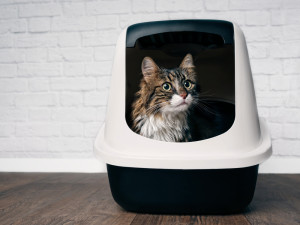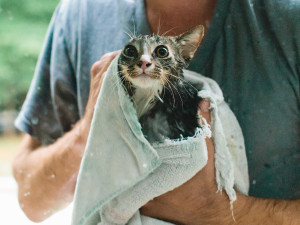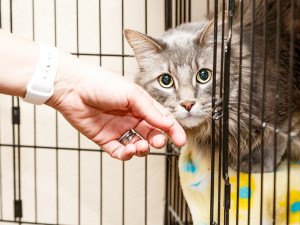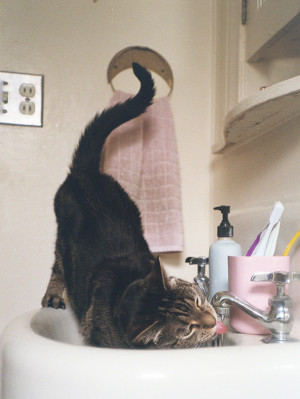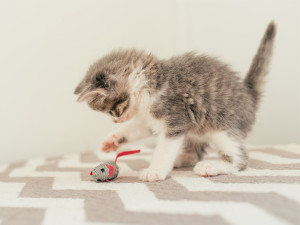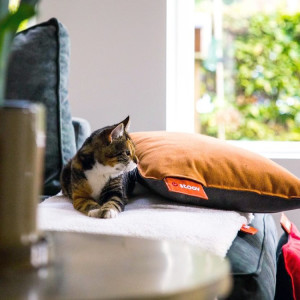11 Ways to Raise Your Cat Parenting Game
Make this new year a great one for your kitty

Share Article
You are such a good cat parent. Great even. In fact, every morning, before your cat starts yowling to be fed, they look at you, sound asleep in your bed, and think, ‘What a wonderful person. How did I ever get so lucky?’ And yet, you could be better. If you wanted, 2025 could be the year that you raise your cat-parenting game to such great heights that your name and tales of your good deeds spread far beyond your own home. You could become a legend among the cats of this and many a far-off land. A fairy tale. A comforting story cat mothers tell their kittens for generations to come. You could be a god. You just have to do these 11 things.
1. Schedule their yearly check-up
A yearly physical examination is a must for any cat, especially if they haven’t been to the vet in a while. Their doctor can establish a baseline for future visits, and it is the perfect chance for you to ask any questions you might have about your cat’s health, behaviour and goals for the year ahead. To get the most out of your visit, take some time a day or two before the appointment to observe your cat and write down any questions that pop into your head.

Get (totally free) deals for food, treats, accessories, tech and way more pet parenting must-haves.
2. Add more litter boxes
Isn’t one litter box enough? Maybe for a regular cat parent, but you’re a super-parent and super-parents know that cats, like people, enjoy a little choice. “The standard litter box formula is ‘number of cats plus one’,” says cat behaviourist Kristiina Wilsonopens in new tab. “That means one cat should always have at least two boxes, two cats should have three boxes, and so on. I actually did a litter box studyopens in new tab a few years back and one of the findings was that cats will often use one box only to urinate and a separate box only to defecate, so extra boxes absolutely help prevent inappropriate toileting behaviours.“
“To ensure a cat will use the litter box (any box), it should be as comfortable and easy for them to use as possible,” says certified feline behaviour consultant and Kinship Collective member Cristin Tamburoopens in new tab (aka The Cat Counseloropens in new tab). “In my opinion, bigger is always better when it comes to litter boxes. Ideally, they should be at least one-and-a-half times the size of the cat, and your cat should be able to easily manoeuvre and turn around without having to play Twister.”
This is also a great time to recommit to cleaning your cat’s litter box(es) every day. That might seem like a lot to take on, but it can be made more manageable through the magic of task stacking. For instance, every time you use the toilet, clean your cat’s litter before you go to the bathroom. Soon, cleaning the litter will become part of your own toilet routine and stop feeling like such a hassle.
3. Create a brushing routine
Mats aren’t just unsightly; they can also cause your cat quite a bit of discomfort. The best way to avoid them is through regular brushings. And it doesn’t have to be a whole big to-do. Just a minute or two of gentle brushing every day can make a huge difference in your cat’s coat and overall well-being.
Again, task stacking can be a big help here when it comes to establishing a new brushing routine for you and your cat.
4. Raid the toy shop
An engaged cat is a happy cat, so make sure they have plenty of toys to keep them occupied when you are at work or otherwise indisposed. Just keep in mind that it may take a little time for your cat to get used to their new toy, especially if they are on the more timid side. You also may need to demonstrate exactly how it is used or add a little catnip or treat scheme into the mix to pique their interest. The beginning of the year is also a great time to resupply yourself with fresh treats and catnip.
5. Become a foster parent
Have you ever looked at your cat and thought, ‘I wonder if they’d like a friend?’ Well, fostering can be a great way to test the waters. And entering into the situation with the intention of finding a companion for your cat, rather than a second cat for yourself, can help you keep a little emotional distance until the final decision is made.
Still not sure you’d make a good foster? Just know that there are lots of ways to be a pet parent, even if you’re not quite ready to bring another cat into your life permanently.
6. Upgrade mealtime
There is absolutely no reason your cat’s food dish can’t be just as pretty-looking as anything else in your house. It doesn’t have to be, but it’s out all the time, so it might as well be something you enjoy looking at. Your cat’s annual check-up (see number one, above) is also a great time to review their diet with your vet and make sure you are on the right track.
You also might want to consider upgrading that water bowl of yours to a water fountain. Some of them are quite lovely, and they are much more affordable than you might think. They are also great for cats who might not otherwise drink enough, making them more susceptible to health issues like kidney disease and bladder inflammation. “Due to their desert origins, cats have a naturally low thirst drive,” says veterinarian Dr Annette Louviere. “However, water fountains can be enticing to some cats as running water is more attractive to them.”
7. Create cat-friendly spaces in high-up places
Most cats love a good perch. They feel safe high atop a nice cat tree, wall-mounted cat shelf or plush cat bed secured to a large glass window. There, they can relax in peace and keep an eye on the world around them. Treat these spaces as sacred by avoiding the urge to touch your cat or move them from these spots for your own purposes, and they will love them even more.
8. Focus on positive reinforcement
Sometimes, cats act out, but positively reinforcing good behaviour is actually the most effective way of creating lasting change.
Clicker training is also possible and doesn’t even take that long. “Even the least little bit of time spent in clicker interactions, perhaps three or four minutes a day, will make changes in your cat,” writes Karen Pryor in the introduction to her book Clicker Training for Catsopens in new tab. “The clicker game may also make your cat more interested in you… not just because you hand out treats, but because you become an interesting challenge… they’re training you to click, and that’s very satisfying to cats.”
9. Get some cat grass
Is your cat constantly chomping on your houseplants? Give them something green to chew on that’s just for them: cat grass (aka wheatgrass, that stuff some people add to smoothies). “Cat grass may not be an essential part of a cat’s diet, but it has been known to provide digestive benefits thanks to its impressive vitamin content: vitamins A and D, folic acid, niacin and chlorophyll,” says Dr Lori M. Teller, a professor at Texas A&M’s College of Veterinary Medicine and Biomedical Sciences. It’s a healthy, fibrous snack and a great “alternative to other [potentially toxic] plants that your cat may try to nibble on – or actual grass in your garden, or nearby, that may be treated with harmful chemicals or home to parasites or bacteria.”
10. Up your cat’s glam game
Have you ever even tried taking your cat to the groomer? The results can be pretty epic. Some cat groomers even do house calls. They can shampoo your cat’s coat, trim the fur around their bums, clip their nails and give them a camera-ready blowout.
11. Make time for play
You got your cat some new toys (number four, above) and maybe even a new kitty companion (number five) but one of the best things any cat parent can do for the happiness and well-being of their cat is simply to play with them, regularly and often.
“Play helps satisfy a cat’s natural need to hunt,” says Tamburo. “In the wild, feral cats spend up to 50 percent of their day hunting, and many of those same actions and behaviours are also seen during play. While many domestic cats spend most or all of their time indoors and rarely or never actually hunt, the instinct is still very much hardwired.”
Play has other benefits, too: it strengthens the human-animal bond, keeps cats active and in better shape, and can improve relationships between cats and other pets in the home – especially if they all play together. Also, cats who are played with regularly are much less likely to exhibit behavioural issues such as excessive meowing and aggression. Here are more tips on how best to engage your cat.
It is going to be such a good year for you two.

Charles Manning
Charles Manning is an actor, writer, and fashion/media consultant living in New York City with his two cats, Pumpkin and Bear.
Related articles
![Cute Siamese cat yawning, showing his teeth and tongue]()
My Cat’s Morning Screams, Translated
What I think my cat is trying to tell me at the crack of dawn. Every. Single. Morning
![Hiker and dog overlooking the top of a mountain]()
8 Ways to Be a More Eco-Friendly Pet Parent
Expert tips to help reduce your pet’s carbon pawprint
![Woman in a white sweater hugging her cat next to a window]()
Is Your Cat SAD?
Find out if your cat has seasonal depression, and how to combat it
![Extremely blissed out cats on a psychedelic background]()
How Catnip Blisses Out Cats
I’m so high right meow
![woman with dark hair lying in bed with striped cat, both asleep]()
Should Your Cat Sleep With You?
Here are the pros and cons of having a feline sleeping buddy
![cat lying on cushion]()
7 Heated Cat Beds to Keep Your Feline Warm This Winter
Because your cat deserves to be cosy, too
